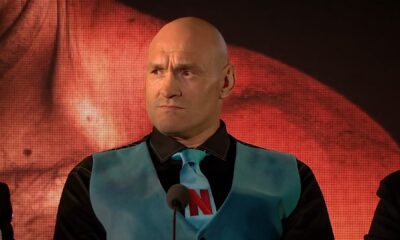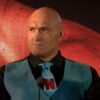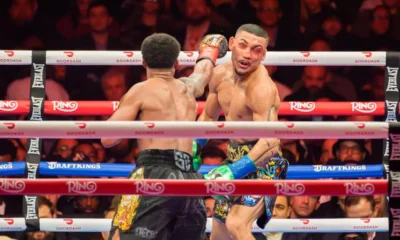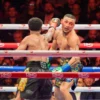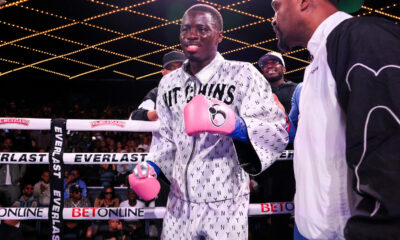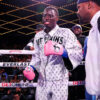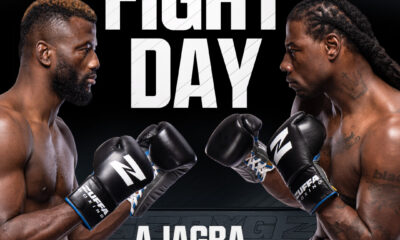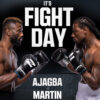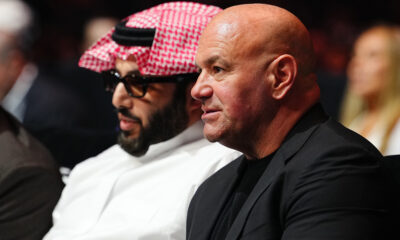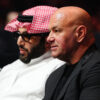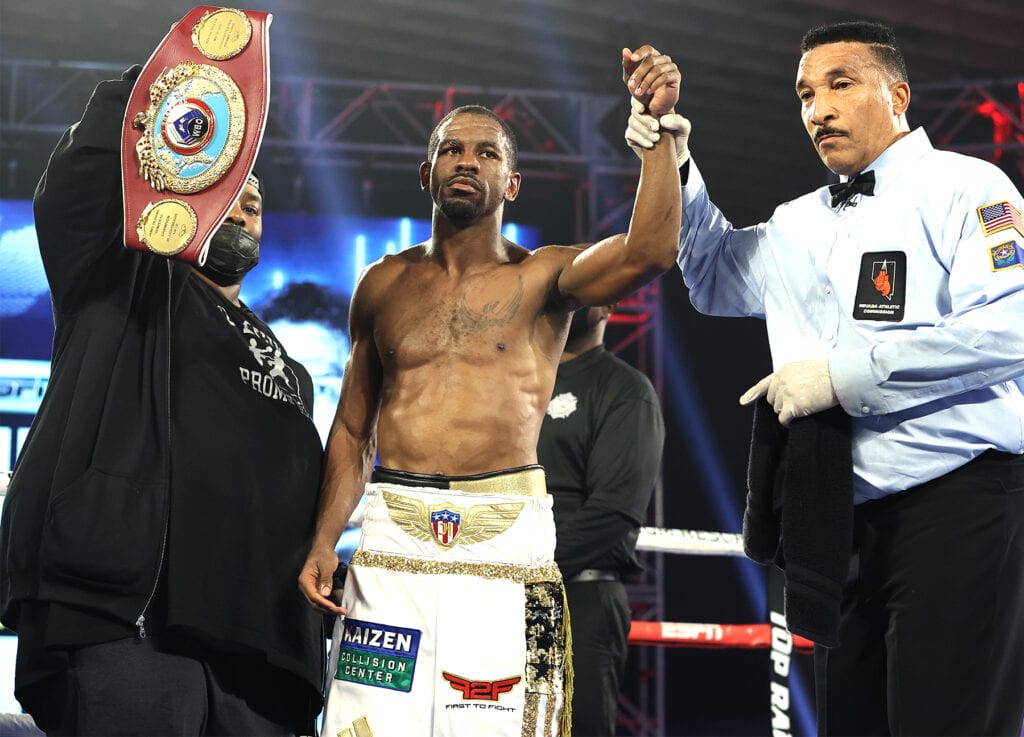
Boxing News
Commentary- Herring Enduring Unfair Criticism After Saturday DQ Win
Commentary- Herring Enduring Unfair Criticism After Saturday DQ Win
A day after his at times ugly, and then in the end, bizarre disqualification win to successfully hold on to his WBO Junior Lightweight title Saturday night in Las Vegas, Jamel Herring has to endure what is unfair criticism.
First, Herring survived his second title defense (and that’s the right word) on a night he was being mauled and fouled by a much less talented and older fighter in Jonathan Oquendo.
Oquendo only had a game plan of leaning and leaping into Herring with his head to try to throw a punch. And then, to make sure there wasn’t a counter from the champion, to grab his right arm in a clinch and grapple him until the referee broke them up.
This tactic/strategy was something that he did multiple times, every round, from the opening bell until the fight finally ended eight rounds later with Oquendo being disqualified.
It was apparent Herring was the better fighter, who landed the more significant punches (including a 3rd round knockdown) and deserved to have his hand raised:
A bloody affair in the main event ends with @JamelHerring retaining his WBO Junior Lightweight strap via disqualification following intentional headbutts.
Debate away: #HerringFrampton ➡️ Who you taking right now? pic.twitter.com/XIgwTGBhA9
— Top Rank Boxing (@trboxing) September 6, 2020
However, let’s go in-depth into a series of observations, and essentially defenses, of the 34-year-old New York native, Herring, who deserves much better than the criticism he was being given on social media Saturday night, and especially on the ESPN broadcast of his title fight.
The first observation is: that the veteran Championship referee, Tony Weeks, did a very poor job of maintaining order from the beginning. As is often the case in these fights, if a fighter is allowed to grab, to hold, or to foul and isn’t sufficiently warned and penalized, especially early in the bout, it’s almost a “green light” to continue to do it.
That is until penalizing and potentially disqualification are taken against him.
Again, it’s not Herring’s fault, when it was apparent in the first round and then again, in the second round, and on and on, that Oquendo was strategically and tactically grabbing him by his right arm and hugging/wrestling him until the ref’s “break” to keep from getting countered.
It’s is the referee’s job/fault, as the official in charge, to first warn Oquendo to stop doing it.
But, then to follow through on the warning(s) by penalizing him a point and next, further warn him that he’s risking disqualification, if he continues to do it.
Weeks was lax with all of that throughout the early part of the fight, and it established for Oquendo that he could repeatedly lead in with his head, grab, mall, and frustrate Herring. And thereby, make the fight an ugly brawl and yet, face no significant consequence.
As I have often said or in this case now in writing about all sports, “participants will adjust, good and bad, to what is consistently being done (or not called) by the officiating.”
And, ultimately, your job as a boxing referee is to not only protect the fighters but enforce the rules that are in place and penalize/disqualify for repeated disregarding of them.
Weeks gets a grade of “D” from me on that, as it took him until the 5th round to actually penalize Oquendo after cutting Herring over the right eye with his latest butt. Take a look:
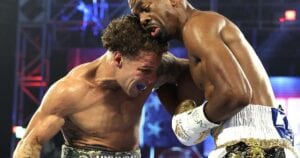
Mikey Williams Top Rank
Nevermind, that Herring’s corner had complained to Weeks in between rounds twice early in the fight to do something about the Oquendo butts.
Next, let’s talk about the obvious “elephant in the room,” and that is Herring was battling something more significant than Oquendo and his lack of talent/tactics. That is COVID 19.
Having not only tested positive for the virus but actually suffering the effects in late June and July with fever, fatigue, and respiratory problems, Herring deserves a lot of credit that he was still trying to follow through and fight as a headliner for Top Rank Boxing.
That seemed to be lost in the emphasis by the television analysts on the ESPN call, former World Light-Heavyweight champion, Andre Ward and former World Welterweight and Junior welterweight champ. Timothy Bradley.
While in the preview mode, ESPN thoroughly explained what Herring had been through with the effects of Coronavirus, it just did not seem that Ward and Bradley were taking it enough into account.
That is to say; Herring was a fighter who had overcome a serious illness just weeks before and was still bold and willing to give it a shot in the main event for minimal prize money (on a big scale) in large part because he has the need and desire for bigger paydays later.
Ask it another way, if Ward or Bradley were already established as “big names/stars’ with large payouts for their fights, would they have risked training on and then fighting, with something as debilitating and unknown on the long term effects as COVID 19?
We all know that answer.
They would have both “bowed out” of training and waited maybe six months or more for all to be “right, again.”
Continuing, it also seemed that Bradley, in specific, was overly critical of Herring not being able to do more with the fouling, mauling, brawling Oquendo. Meanwhile, he (nor Ward) really emphasized that Oquendo has tactics were being allowed by Weeks and were the only real reason to fight was being prolonged.
Then, after the Oquendo butt caused that nasty cut in the fifth round, and the blood flowed over Herring’s right eye, neither Ward nor Bradley took the stance or even suggested the Herring was being made to endure something that Weeks should have put a stop to right, then- as in DQ him.
They instead tried to relate previous adversity in their ring in their own careers, including Ward concerning when he was cut in a previous fight and how he had reacted and “pushed through it.”
However, it’s not the same while being repeatedly fouled, mauled, and now, cut, yet being asked to go on.
And, that comparison of differences should have been made clear, including by ESPN play by play man, Joe Tessitore, too.
Again, neither former fighter/analyst could or would relate to a previous instance in their careers, where they had been repeatedly fouled, mauled, and suffered some cut or eye swelling, and what they did about it?
No. We were just left with a steady dose of critical analysis of what Herring wasn’t doing to get Oquendo out of there, while Herring’s frustration was clearly growing.
Finally, as the fight pressed on into the 7th and 8th round, it was evident to me and obviously to the judges at ringside in the Vegas “bubble,’ that Herring had built an insurmountable lead.
Never mind the fact that Ward had almost comically scored the 6th, 7th and 8th rounds for Oquendo on his unofficial card shown on the ESPN screen.
In Ward’s slight defense, he’s sitting in his house, broadcasting the fight over video connection for ESPN. So, he is detached from the actual arena, but still, there was no excuse for him to be that clueless if he’s going to “amateur judge” fights for them.
Indicating, Herring out-landed Oquendo in every round, including rounds six through eight, yet Ward scored for the sloppy mauling veteran.
Oquendo never in any round established a sustained offense, backed up Herring, much less stunned or hurt him with any of his punches. Herring repeatedly did that in almost every round of the fight.
To have an unofficial scorecard that was 4 – 4 after eight rounds, when the two official judges had it 8 – 0 and the other 7 – 1, tells you all you need to know about whether Ward got it in his head (including Bradley’s criticism) that the fight was going a certain way.
And further, he couldn’t judge accurately on what was really happening- Herring repeatedly out landing and winning rounds despite the tactics by Oquendo.
Then came the end to the fight after the eighth round.
This, as we heard Herring on ESPN’s mics telling his corner and the ringside physician from the Nevada Commission, that he could not see out of his right eye with blood flowing down.
Weeks correctly told Herring’s corner that he could not advise them on what to do, as they were asking whether or not if they stopped, it would mean a loss?
The doctor eventually said to Weeks, “he can’t see, Tony. He can’t continue.” And Weeks waved the fight off, and but then, there was further added confusion.
Confusion again, that is not Jamel Herring’s fault, nor he deserved.
Weeks is responsible for knowing the rules and so too, is the Nevada Commission and the WBO, which was sanctioning the fight as a World Championship one.
It has now been revealed in the aftermath that according to the unified rules of boxing in the U.S. and around the world in title fights, Weeks erroneously did not take two points away from Oquendo for the intentional foul he ruled in round five.
That’s black and white in the rules in Nevada and the WBO.
Further, after all of the discussion for several minutes by Weeks and the officials at ringside, and then the eventual announcement that it was a disqualification, that was incorrect, too.
If it was going to be a DQ, it should have been after round five, when the foul happened.
By fighting three rounds more, Weeks should have ordered the fight to a technical decision, because Herring could and did continue to fight.
Still, the official judge’s cards showed, that it would have been no issue for Herring to retain his belt on the technical decision, as he had pitched a shutout.
Probably, the most damning and inciting of the comments, though, were Bradley’s during the interim of the fight being stopped and before the official announcement was made.
Bradley was repeatedly critical of Herring performance, again while not taking into account that Weeks had allowed Oquendo to maul, foul, and frustrate him for eight rounds.
Never once did Bradley, specifically, say something like “if he kept butting me, I’d foul him back” or “my corner better step in front of me and tell the ref to either make him stop or DQ him long before now.”
No, instead, it was Bradley’s criticism that he thought Herring “was looking for a way out,” which is the equivalent of saying “looking to quit/yet be declared the winner.” And, it’s a particularly damning comment coming from a former Championship fighter.
Now, let’s keep some perspective.
Herring is a former two tour of duty, United States Marine, who enlisted and then, in the 2000s through the 2010s, saw active combat duty in the Iraq War.
Herring was risking his life every day as a gunner on top of a personnel carrier vehicle in the Middle East.
Every day.
In this outstanding feature done by ESPN Mark Kriegel that aired prior to the fight, Herring recounts how he thought, almost daily, that he could be killed by sniper fire or an explosive device, while on top of that Humvee.
And, that went on/taking it’s toll on him mentally, day after day, week after week, etc. in Iraq:
Perseverance and Triumph: @JamelHerring's journey forever makes him one of boxing's most inspirational figures. (via @MarkKriegel)#HerringOquendo | TONIGHT | ESPN+ pic.twitter.com/daE9g72ZXG
— Top Rank Boxing (@trboxing) September 5, 2020
You further add on the heartbreaking story of Herring’s infant daughter had died from sudden infant death syndrome just after his second tour of duty, 11 years ago.
You add more on top of Herring having been and still being treated for “Post-Traumatic Stress Disorder.”
And, now, you top all of it off with a battle with Covid-19, jeopardizing a significant payday to headline for Top Rank and his future afterward, if you can’t or won’t fight with it.
And yet, Bradley wants to question whether Herring “was looking for a way out?”
Further and badly for ESPN’s coverage, Bradley wasn’t disputed by Ward, Tessitore, or anyone else for saying it.
If anything, Herring’s life for the past 15 years has been only facing adversity and possible death and tragedy head-on. And, he would be an individual or fighter, as far away from “looking for a way out,” as the Moon!
At the minimum, Bradley (who was also sitting in the comfort of home, probably making more than Herring, while calling a fight on TV hookup) owes Herring an apology for being overly critical/that last professional insult.
This is, especially with what’s laid out above that Herring has and continues to go through outside of the ring.
The end result is Herring getting his needed win. Still, you can tell by his social media posts overnight that the criticism that he found out about, once the fight was over and while he was at a local hospital being treated for the eye injury, has hurt him:
Sitting in a hospital, alone, while being called out with all sorts of negativity is something else. I’m not angry, I’m not sad, just deep in thought. I will still fulfill my obligations against Frampton, but that fight may be my last. Lost too much time from my family as it is?? pic.twitter.com/xAxYPbU5Dk
— Jamel Herring (@JamelHerring) September 6, 2020
Herring did receive encouragement later on Sunday morning from former two Division World Champion Carl Frampton, as they are slated to fight probably at the beginning of next year:
Congratulations champ @JamelHerring on retaining your title. Heel up and let's get this done before the end of the year. Three weight incoming
— Carl Frampton MBE (@RealCFrampton) September 6, 2020
It will be guaranteed that when Herring heals up, he won’t have to worry about Frampton taking the tactics that the less talented Oquendo was allowed to take.
No, this will be a fight on its merits when it happens.
And, hopefully, for Herring’s sake, both the referee in the ring and the broadcasters calling the fight will have better nights than what they did Saturday.
A veteran broadcaster of over 25 years, T.J. has been a fight fan longer than that! He’s the host of the “Big Fight Weekend” podcast and will go “toe to toe” with anyone who thinks that Marvin Hagler beat Sugar Ray Leonard or that Tyson, Lennox Lewis or Deontay Wilder could have beaten Ali!


